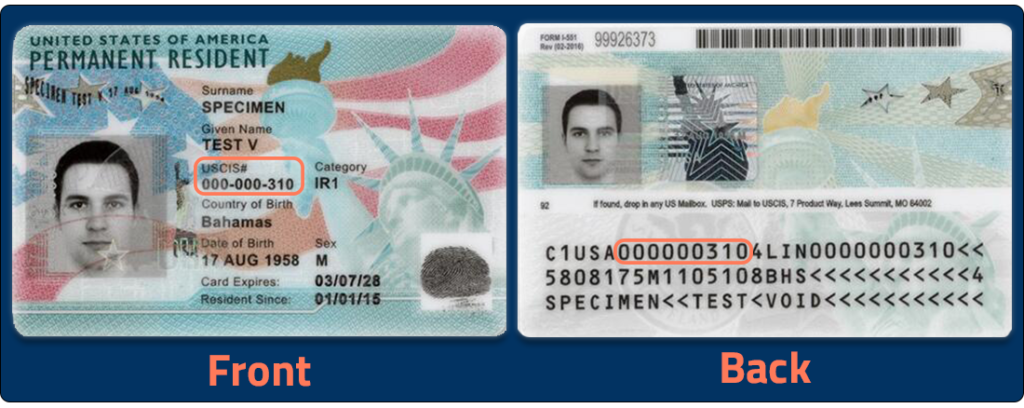
An Alien Registration Number—also called an A-Number—is a seven-to-nine-digit number assigned to green card holders by the Department of Homeland Security. Typically, nonimmigrants in the United States only temporarily don’t receive Alien Registration Numbers. However, nonimmigrant classes holding employment authorization documents or some other benefits are the exception with an A-Number.
If you were issued a green card/permanent resident card (Form I-551) after May 10, 2010, you’d be able to find your number on the front, next to your picture. The back of the green card also contains the alien number.

Older green cards, issued between 2004 and 2010, have the Alien Registration Number listed as “A#.”
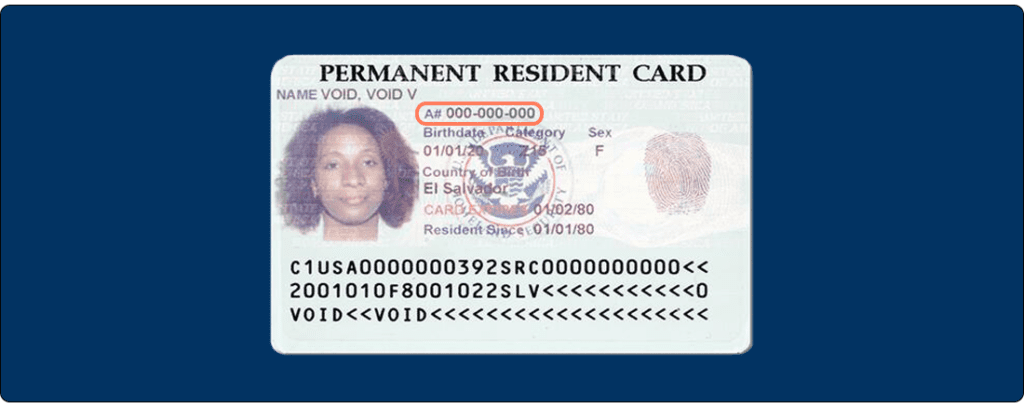
If you do not have a permanent resident card but have a work permit (Employment Authorization Document), you can find the Client Registration Number under the USCIS#. It will look something like this: 000-000-001.
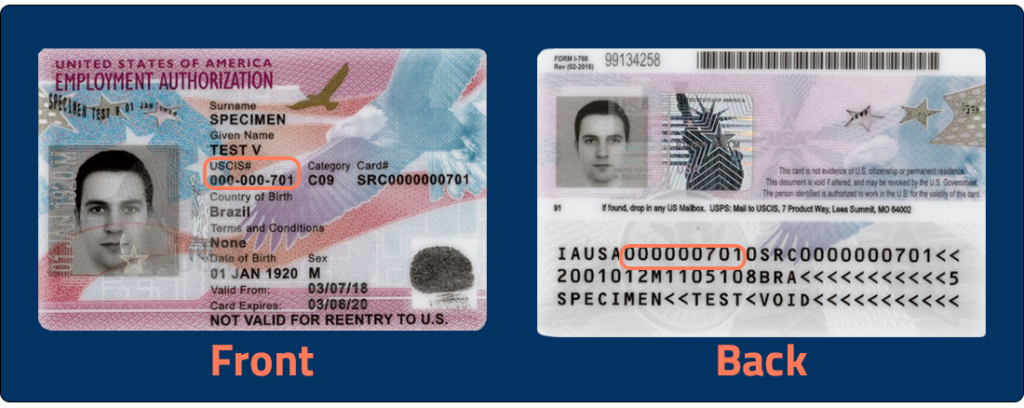
Your immigrant visa in your passport—also known as a visa stamp/visa foil—also contains your A-Number. You can locate it on the right-hand side below your case number.
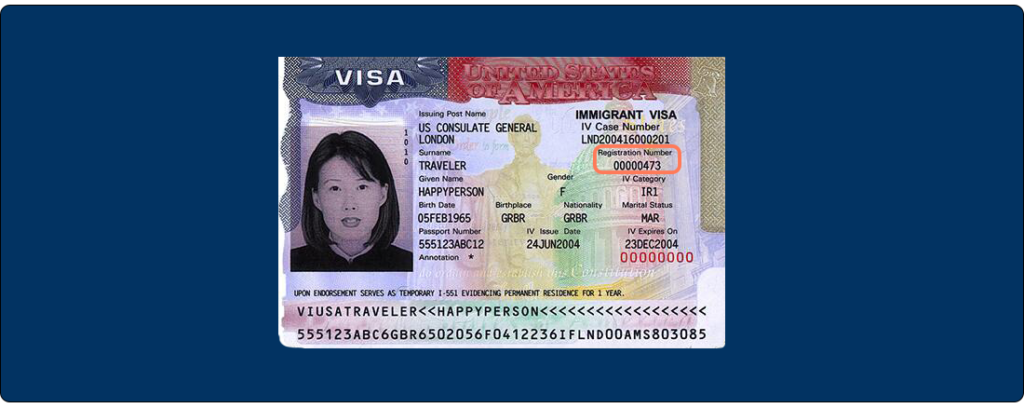
You may be able to locate your A-Number on some versions of the Notice of Action, Form I-797C, in the field “USCIS#.”
You could locate your A-Number on the Immigrant Data Summary, which the U.S. embassy or consulate gave you if you applied for your green card through consular processing at a U.S. embassy or consulate.
Suppose you applied for your green card via consular processing. In that case, you can also find your Alien Registration Number on the USCIS Immigrant Fee handout the immigration officer gave you. Your Alien Registration Number is on the top right-hand side.
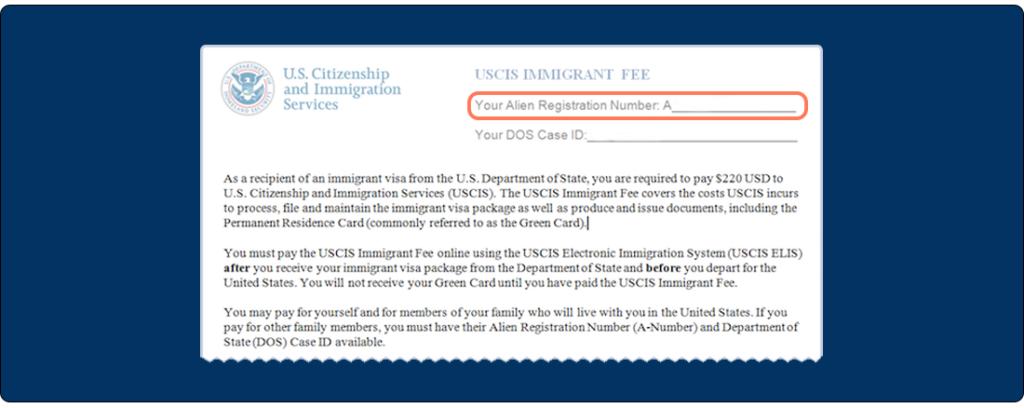
Typically, H-1B visa holders don’t get an alien registration number unless they have a green card case processing and have applied for an I-140, Immigrant Petition for Alien Worker. The government would then issue an alien registration number when they approve the H-1B holder’s I-140.
Below are some of the most common questions regarding Alien Registration Numbers.
You can request your Alien Registration Number (A-Number) through the Freedom of Information Act (FOIA). If you cannot locate your Alien Registration Number, you can request it through the FOIA Request, Form G-639. Expect to wait at least eight weeks for USCIS to respond to your request for your alien number. VisaNation Law Group is happy to help you file this if you are unsure of your A-Number. Again, expect to wait at least eight weeks for USCIS to respond to your request for your alien number.
To find your alien registration number for H-1B, you can find it in the same locations as previously mentioned, including a visa stamp on your passport, work permit, green card, etc. If you need assistance completing your H1B registration, check out this complete guide.
USCIS also offers a step-by-step video guide below.
The alien registration number for H-4 is the 7 to 9-digit number we’ve discussed throughout this entire post.
Sometimes people use the term Alien Registration Number card interchangeably with a green card, permanent resident card, or visa. However, it’s important to know there is no actual Alien Registration Number card, just the number present on various immigration forms and documents of permanent residents and certain nonimmigrants.
For H-1B applicants, once your employer files the PERM application and I-140, USCIS will assign you an Alien Registration Number. You can find it on Form I-797C Notice of Action under Beneficiary Alien Number.
No, these are not the same, and you should not be use them interchangeably. The PERM Labor Certification Case number is 11 digits and assigned by the Department of Labor for PERM Labor Certification applications.
On your Employment Authorization Document, the “USCIS#” is your Alien Registration Number. The section next to “Card#” is your EAD card number.

Unfortunately, H-4 holders do not get assigned an Alien Registration Number. Only the primary H-1B holder has one. The H-1B holder can find it on their I-140 approval.
F-1 visa holders with employment authorization get an Alien Registration Number, even if they are not trying to apply for a green card.
Marriage green card applicants going through consular processing get their A-Number at the consular interview. If you are already married to your U.S. citizen partner, your Alien Registration Number will arrive roughly 30 days after filing the green card application (I-485). If you are married to a green card holder, you need to wait for your I-130 petition to be approved before you file your I-484 (green card application) and wait for your immigrant visa to become available. Your A-number will be sent to you roughly a year into that process.
If you can’t find your Alien Registration Number on any USCIS documents or visas, then the Freedom of Information Act system is in place to help you get ahold of your immigration file, which includes the number. Alternatively, you can schedule an InfoPass appointment at your local USCIS office.
No, these are distinct numbers. Your USCIS case number (also called receipt number) is the one USCIS assigns to your application. The government uses the Alien Registration Number to identify you as a person. The USCIS case number is 13 digits and always starts with three letters and then 10 numbers. Your A-number (seven to nine digits) remains the same across your documents, visas, or green cards. If you apply for a green card and then apply for citizenship later on, the two applications you fill out will have different USCIS case numbers, but the same A-number will be listed. If you see “USCIS#” or “USCIS number” on documentation that doesn’t use the word “case” after it, then you should use your Alien Registration Number in that instance. As you can see, it can get quite confusing, so we highly recommend trusting your immigration case with an experienced attorney.
The receipt number is a unique 13-character identifier that USCIS provides for each application or petition it receives. The agency uses it to identify and track its cases.
The receipt number consists of three letters-for example, EAC, WAC, LIN, SRC, NBC, MSC or IOE-and 10 numbers. You can find it on notices of action USCIS has sent you.
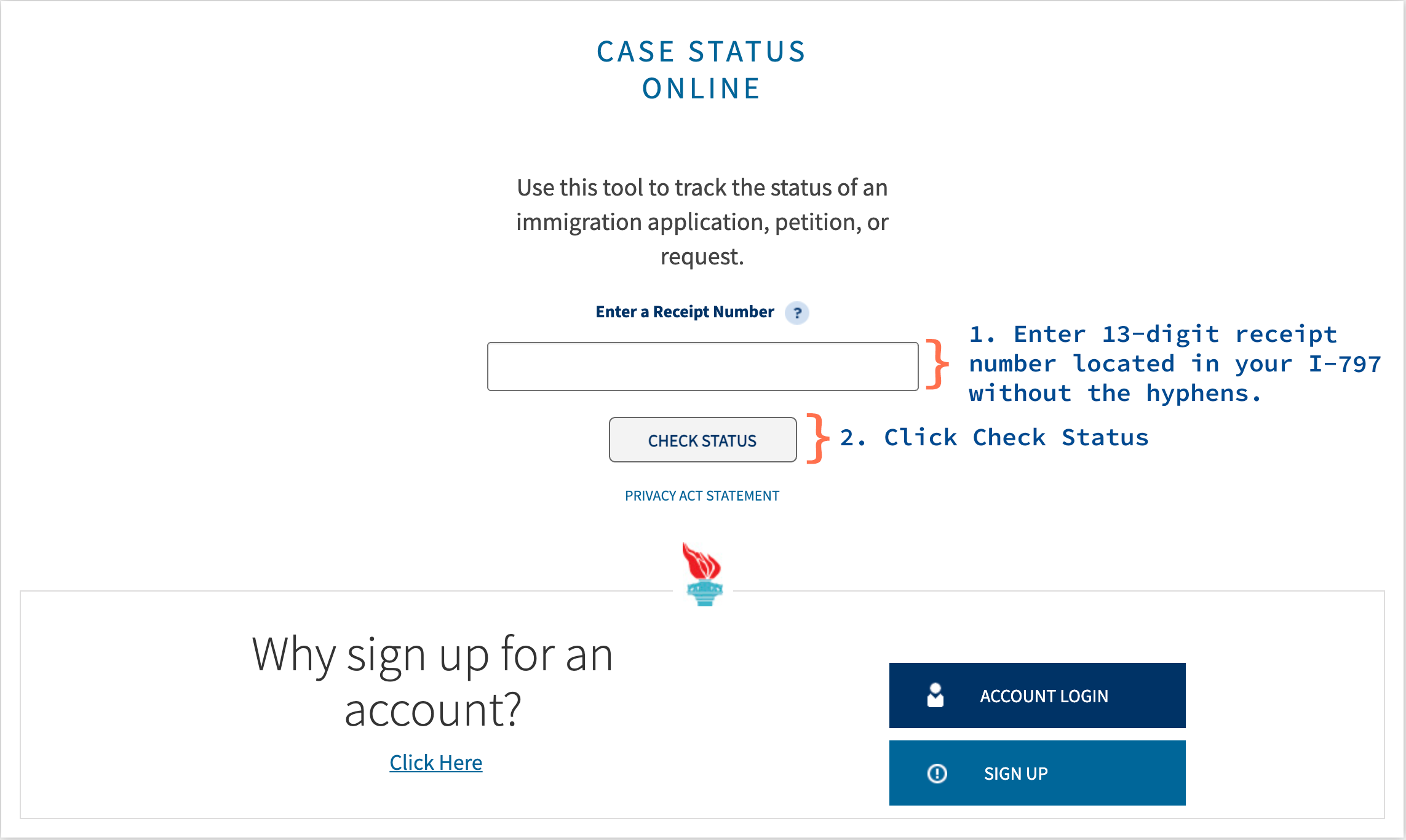
No. This is another crucial distinction and can confuse. The Internal Revenue Service and Social Security office use the Social Security Number (SSN) to track a U.S. worker’s taxes, income, and other financial information. When you file your work permit in conjunction with your green card application, you can apply to get an SSN. Those with an SSN should keep it confidential to avoid fraud and unauthorized credit applications.
Understanding the complexity of all the immigration abbreviations can be time consuming and make you prone to mistakes. For that reason, and many more, it's highly advised to have a qualified team of immigration experts work on your case to ensure all the proper documents are submitted along with the correct corresponding alien numbers, USCIS case numbers, and other immigration identifiers. VisaNation Law Group takes great pride in their client's successes and ensures that all applications and supporting documents are prepared accurately and filed with USCIS in a timely and efficient manner.